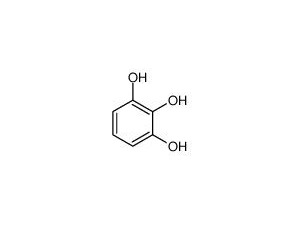
Pyrogallol
CAS No. 87-66-1
Pyrogallol ( Pyrogallol; 2,3-Dihydroxyphenol; Benzene-1,2,3-triol; NSC 5035 )
Catalog No. M19211 CAS No. 87-66-1
Pyrogallol is a white crystalline powder and a powerful reducing agent prepared by heating gallic acid.
Purity : 98%
 COA
COA
 Datasheet
Datasheet
 HNMR
HNMR
 HPLC
HPLC
 MSDS
MSDS
 Handing Instructions
Handing Instructions
| Size | Price / USD | Stock | Quantity |
| 500MG | 35 | In Stock |


|
| 1G | 42 | In Stock |


|
Biological Information
-
Product NamePyrogallol
-
NoteResearch use only, not for human use.
-
Brief DescriptionPyrogallol is a white crystalline powder and a powerful reducing agent prepared by heating gallic acid.
-
DescriptionPyrogallol is an organic compound with the formula C6H3(OH)3. It is a white solid although because of its sensitivity toward oxygen, samples are typically brownish. Pyrogallol can be used in hair dying, dying of suturing materials and for oxygen absorption in gas analysis. It also has antiseptic properties. Pyrogallol was also used as a developing agent in black-and-white developers, but its use is largely historical except for special purpose applications. (Hydroquinone is more commonly used today.)
-
SynonymsPyrogallol; 2,3-Dihydroxyphenol; Benzene-1,2,3-triol; NSC 5035
-
PathwayGPCR/G Protein
-
TargetHistamine Receptor
-
RecptorOthers
-
Research AreaCancer
-
Indication——
Chemical Information
-
CAS Number87-66-1
-
Formula Weight126.11
-
Molecular FormulaC6H6O3
-
Purity98%
-
SolubilityDMSO : ≥ 100 mg/mL 792.96 mM H2O : 50 mg/mL 396.48 mM;
-
SMILESC1=CC(=C(C(=C1)O)O)O
-
Chemical Name1,2,3-Trihydroxybenzene
Shipping & Storage Information
-
Storage(-20℃)
-
ShippingWith Ice Pack
-
Stability≥ 2 years
Reference
1.Guo TL,et al.Contact sensitizing potential of pyrogallol and 5-amino-o-cresol in female BALB/c mice.2013 Dec 15;314(2-3):202-8.
molnova catalog


related products
-
Pyrogallol
Pyrogallol is a white crystalline powder and a powerful reducing agent prepared by heating gallic acid.
-
Decloxizine
Decloxizine is a H1 receptor antagonist.
-
Calcium carbonate
Calcium Carbonate is the carbonic salt of calcium (CaCO3).



 Cart
Cart
 sales@molnova.com
sales@molnova.com


